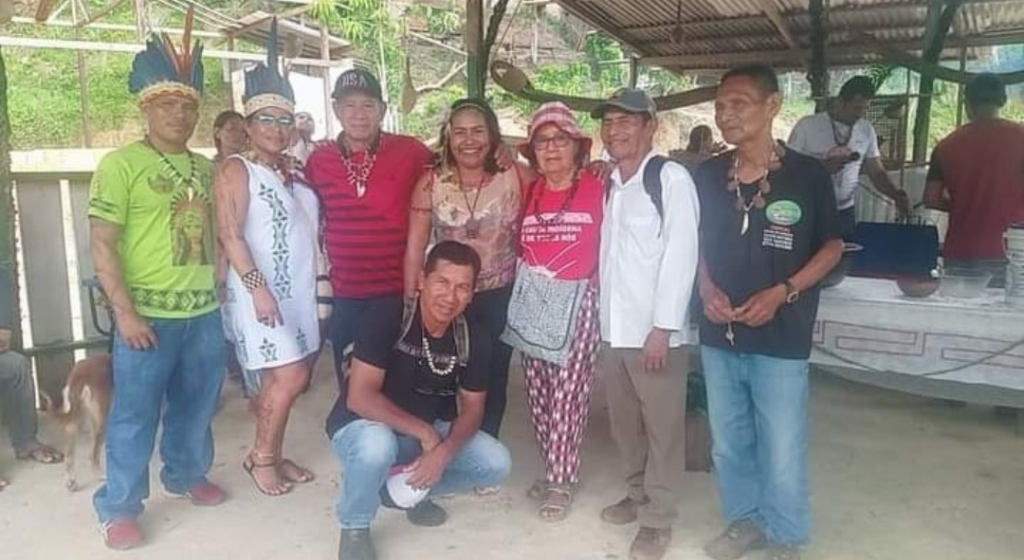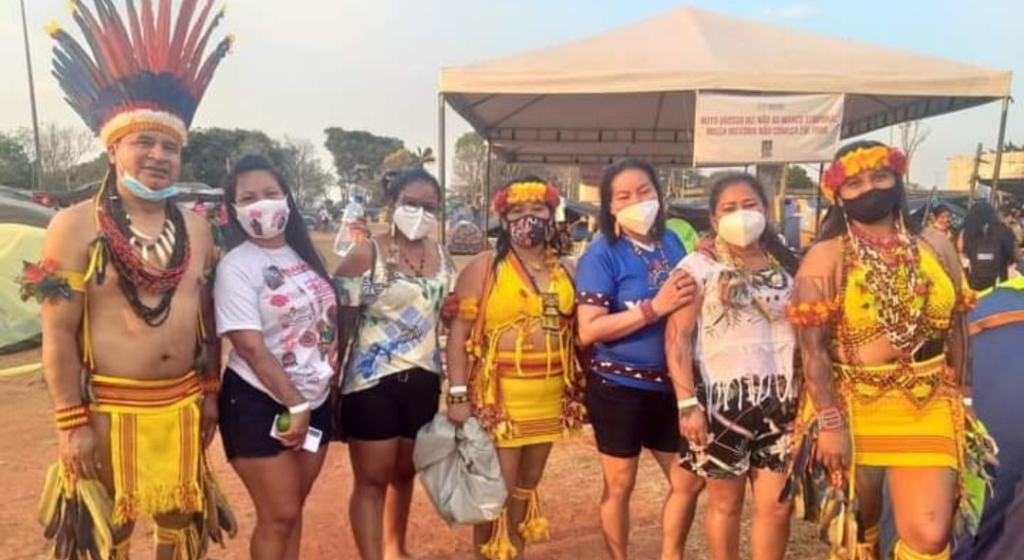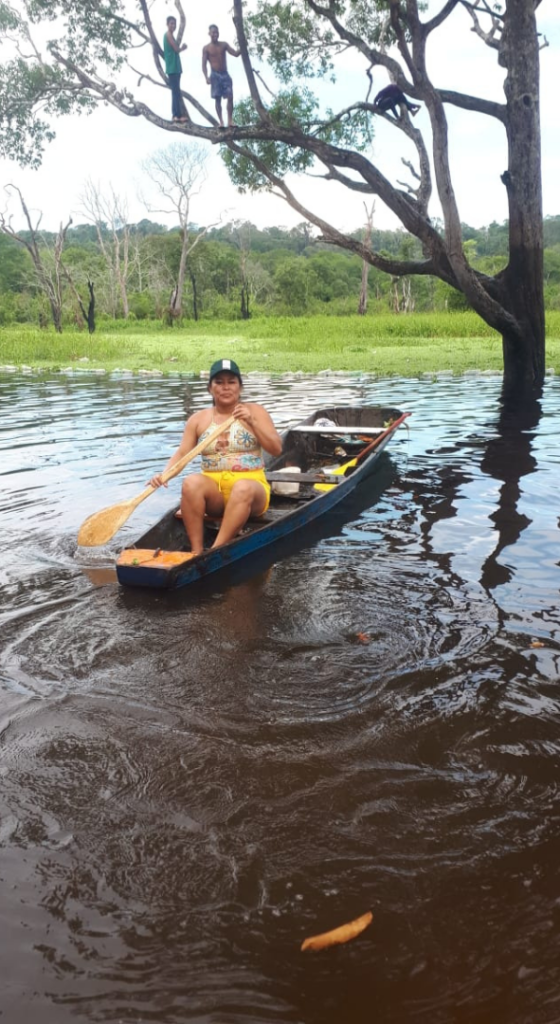In the remote regions of Alto Solimões, in the Amazon, where the rivers weave together communities and cultures, and the borders of Brazil meet Colombia and Peru, stories of resistance, leadership, and female indigenous empowerment emerge. One such story is that of Marciane, a woman from Santo Antônio do Içá, whose journey stands as a testament to the power of unity, cultural heritage, and the ongoing struggle against prejudice and all forms of adversity.
Author: Ivi Pauli
Leia em Português
A Community Rich in Culture and History
Marciane belongs to the Kokama ethnic group and leads, as Chief, an indigenous community living in an urban context in the small town of Santo Antônio do Içá. Situated on the banks of the Solimões River, this town is a true mosaic of cultures and histories. Co-inhabiting this territory are various indigenous ethnic groups, including the Tikuna, Kaixana, and the Kambeba-Omágua. The tranquil streets and the lush surrounding nature provide the perfect setting for a community striving to reconnect with its roots and traditions.



The Achievement of a United Community
Marciane’s leadership is profoundly marked by her ability to bring people together and strengthen bonds. Her vision and determination are inspiring, demonstrating that when a community unites under strong and empathetic leadership, authorities recognize and respond to collective strength. In one of her most recent achievements, she mobilized her community to ensure the immediate construction of a street that was scheduled, like so many other things, for months later. Thanks to the support of the residents, the project was completed in record time for the region and left the community impressed.
Challenges and Overcoming
But it wasn’t always this way. Her leadership, now widely accepted by the community, was earned through much struggle and constant effort. Marciane’s life vividly illustrates the challenges faced by indigenous women in urban and rural contexts, where prejudice and mistrust are persistent barriers.
“In the urban context, indigenous people suffer even more from prejudice and are often viewed with mistrust. Even within their own communities, there is a devaluation of those who do not speak the ancestral language, so we are also seeking this cultural revival.“
Cacica Marciane
Despite these obstacles, Marciane and other female leaders continue to fight for the rights and well-being of their communities. “Our knowledge is forged in daily struggle,” she says. This dedication translates into tangible achievements, such as access to basic services, as well as the promotion and appreciation of indigenous culture and identity in local schools.
The Importance of Unity and Mutual Support
Marciane knows that teamwork and mutual support are essential for success. She dreams of uniting the women in her community to further strengthen their actions. “If we come together, we will be stronger and more resilient,” she says.
As a concrete action, the Chief is committed to strengthening the artistic vein and indigenous craftsmanship of the women in her community, many of whom are single mothers who need to support themselves and their children. In this way, she contributes to the empowerment and appreciation of the role of other women in the community, while encouraging the revival, preservation, and recognition of the cultural traditions of her Kokama people.
This vision of collaboration is a beacon for many other female leaders who seek to make a difference in their territories. Marciane’s experience with the Amazon Indigenous Women’s Network, Makira-e’ta, has been fundamental in promoting collaboration and the exchange of knowledge. Marciane reports that she feels an enormous sense of security being surrounded and strengthened by other indigenous women. This vision of collaboration is a beacon for many other female leaders who seek to make a difference in their territories.

“In 2019, I was called by Makira-e’ta to go to Brasília for the Women’s March. It was my first time traveling by plane and I was terrified; I didn’t even know how to check in. But I went with other colleagues, and we started exchanging ideas and forming alliances. It was a very emotional experience to see so many indigenous peoples united. I met other peoples, talked, and participated in their rituals. It was a remarkable experience that I will carry with me for the rest of my life.“
Cacica Marciane
Her story is not just about personal overcoming, but also about the evolution and empowerment of an entire community. Women like Marciane are breaking barriers, leading with courage, and inspiring new generations to embrace their identities and take their places.
The Relationship with Her Grandfather and the Encouragement of Leadership
Marciane’s story is deeply intertwined with that of her grandfather, a respected healer in her Kokama community. From an early age, he encouraged her to learn and preserve traditional knowledge. “My grandfather always said, ‘My daughter, everything I know, I want to pass on to you,'” Marciane recalls fondly. Her grandfather’s wisdom and teachings were crucial for her development and growth as a natural leader.
After her grandfather’s death in 2019, Marciane was chosen by her family to take on the role of chief, a recognition of her dedication and capability. However, the journey was not easy. Marciane faced discrimination and resistance, being called a “false chief” by members of her own family. Despite the adversities, she never gave up. With resilience and wisdom, she earned the respect of her community, becoming a recognized figure not only locally but also in other municipalities and in the capital, Manaus.
Today, Marciane sees this curiosity and aptitude for leadership in her youngest son, who is 9 years old. “Wherever I go, he follows me. ‘I want to be a Chief, like mommy,’ he told his teacher when she asked what he wants to be in life, and she told me,” Marciane reports with pride.

Conclusion
The prominence and leadership of indigenous women, exemplified by Marciane, are crucial for the social and cultural transformation of indigenous communities. These women, with their stories of resistance and success, demonstrate that it is possible to overcome prejudice and difficulties through unity, determination, and wisdom. The legacy of Marciane and other indigenous female leaders continues to inspire and shape a future where respect for cultural diversity is a fundamental pillar.
The life stories of Marciane and many other indigenous leaders are true lessons in perseverance and love for their community. They remind us of the importance of recognizing and supporting voices that are often silenced but have the power to transform the world around them.

Your donation can have a positive impact on the world!
Subscribe to receive our Newsletter!
Find us also at Linkedin, Facebook, Twitter or Instagram
www.meli-bees.org
❤️


One Reply to “The Prominence and Leadership of Indigenous Women: The Inspiring Story of Chief Marciane”